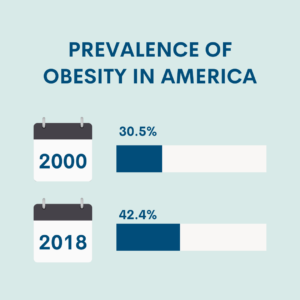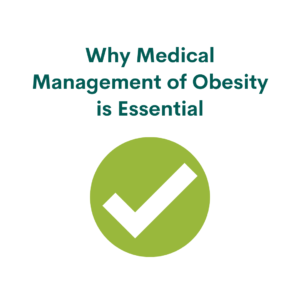Why Obesity Is More Important To Treat Now, Than Ever Before

Why Obesity Is More Important To Treat Now, Than Ever Before
Written by: Dr. Aparna Chandrasekaran
—
Obesity is defined as an abnormal or excessive fat accumulation that presents a health risk.
It took many years for the medical society to recognize obesity as a diseased state, but in fact it’s a chronic disease similar to diabetes or hypertension. Obesity is a multifactorial, relapsing disease in which abnormal fat mass in the body leads to adverse physical, metabolic, and psychosocial health outcomes.
America spends about $2 billion on obesity-related health care costs every year and the prevalence of obesity from 2000 to 2018 increased from 30.5% to 42.4%.

Obesity is a growing epidemic in the middle of a pandemic. Currently, about two-thirds of adults in America are overweight and that number is expected to go up steadily if we don’t take action, immediately.
There are about 236 diseases and thirteen types of cancer which are directly linked to excessive weight. In fact, COVID-19 is the latest addition to this growing list of medical illnesses. The CDC listed obesity as one of the risk factors linked to severe illness from COVID-19, emphasizing the need to take weight issues more seriously than ever before.
Recognizing obesity as a disease has been a game-changer. It has helped to remove the stigma and biases associated with weight. It has also educated the public and healthcare professionals about treating people suffering from weight-related issues with empathy and dignity.
We now know that obesity is not anyone’s personal choice but a complex disease state caused by an interplay of genetic, environmental, and metabolic factors. That being said, the management of this complex disease is not simple either.
Obesity should be investigated and treated like any other chronic medical disease, similar to diabetes or heart disease. Contrary to the common belief, which is often compounded by TV commercials, one cannot fix weight issues with portion-controlled, pre-packaged meals alone.

Here are a few reasons why medical management of obesity is essential:
- Studies have shown that medical management of obesity under the supervision of a trained physician has better outcomes and longer-lasting results than self-directed or commercial weight-loss programs.
- Many patients need lifestyle modifications like healthy eating and exercise, in addition to behavioral counseling and prescription weight loss medication.
- Working with an obesity medicine specialist can significantly improve the patient’s experience and overall outcome.
- Being proactive and starting medical treatment for obesity makes economic sense as these individuals are at risk for developing additional and more costly chronic diseases.

Here are some of the myths and misconceptions about weight loss treatment:
- Weight loss medications have many side effects.
- The truth is that side effect profiles of the weight loss medications are no greater than most of the medications on the market. These medications are to always be prescribed and closely monitored by an obesity medicine specialist.
- Weight loss medications cannot be taken for more than 3 months.
- The truth is that when we categorize obesity as a chronic disease like diabetes, it has to be treated in the same way. No one with diabetes takes a short course of anti-diabetic medications.
- Weight-loss medications are not safe.
- The truth is that no medication is 100% safe. We always balance the risk versus benefit before starting any treatment and weight loss medications are no exception to this rule. Commonly prescribed weight-loss medications are all FDA-approved.
I want to emphasize that there is no quick fix to the weight problem. So be cautious subscribing to fad diets or over-the-counter diet products that promise quick results as they can actually be detrimental to your health.
Weight loss is a journey. There can always be roadblocks, but with a trained weight-loss professional as your guide, your journey will surely take you to a healthier destination.
Be well and stay healthy.
